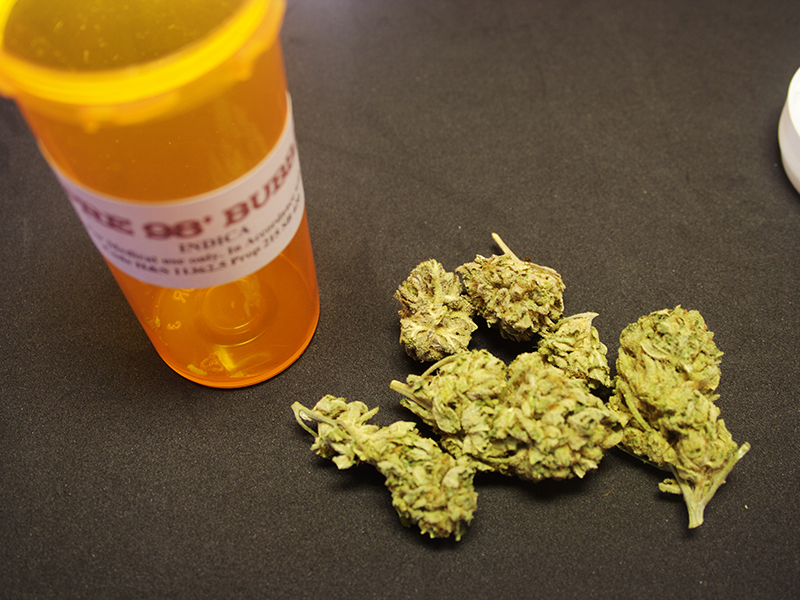Having survived two bouts of cancer, Rabbi Levy Teitelbaum says he can understand why other sufferers may seek relief with marijuana, even though he has never tried it himself.
Rabbi Teitelbaum, director of the Ottawa Vaad HaKashrut (OVH), made international headlines last month with the announcement made on the eve of Rosh Hashanah that the OVH had granted the first kosher certification to a Canadian medical marijuana producer.
He worked with the Hydropothecary Corporation of Gatineau, Que., for almost a year, to ensure that it could meet the OVH’s standards, before issuing approval of its line of processed goods.
“I don’t want to say it’s more important than the hechsher,” said Rabbi Teitelbaum, “but for people who keep kosher and whose doctor has prescribed marijuana, it gives them a reassurance that they are not doing something bad – there is still a stigma around it. We are showing them that we are with them on this.
READ: OTTAWA VAAD CERTIFIES FIRST KOSHER MEDICAL POT IN CANADA
“If we can help make a person’s day a little better, a little more tranquil, then we are doing good.”
Rabbi Teitelbaum said there has been a need within the Ottawa Jewish community for kosher medical marijuana products.
Hydropothecary’s products include Decarb, a ready-to-consume, activated marijuana powder for oral use; Elixir No. 1, a cannabis peppermint oil in mist form; and a line of milled cannabis products called H2.
A public company incorporated in 2013, Hydropothecary is located on a 26-hectare farm in Gatineau, where the plants are grown in greenhouses. It is the only Quebec cannabis producer that’s licensed by Health Canada.

Rabbi Teitelbaum appreciates the debate among kashrut authorities over whether medically prescribed marijuana requires kosher certification. There is a difference of opinion even between the major kashrut supervisors in Canada.
In January 2016, the Toronto-based Kashruth Council of Canada, which issues the COR hechsher, stated that certification was unnecessary, because therapies prescribed by a doctor don’t need to be certified. It made the declaration after MedReleaf, a medical marijuana producer in Markham, Ont., applied for certification.
Montreal’s Vaad Ha’ir, which uses the MK symbol, disagreed. Executive director Rabbi Saul Emanuel said at the time that, “Any product which is ingested … must bear kosher certification.”
That position is in line with that of the Orthodox Union, which began certifying medical marijuana products when they became legal in New York in January 2016.
‘If we can help make a person’s day a little better, a little more tranquil, then we are doing good.’
Rabbi Teitelbaum said that in its pure, natural state, the cannabis plant is inherently kosher, but that’s not true of processed products.
OVH’s kosher supervision ensures that the plants used by Hydropothecary are not infested with insects at any stage of the production process and that the production line is exclusively used for kosher products. It will also ensure that added ingredients – such as flavourings, oils and capsule casings – are kosher, he said.
Rabi Teitelbaum emphasized the stringency of the OVH’s standards and supervision, which will include an audit of cleaning protocols and on-site inspections throughout the year.
“This is a rigorous, independent, third-party certification process that goes from A to Z,” he said. He described a “beautiful harmony” between the OVH and the company, whose dedication to quality and concern for its consumers’ dignity impressed him.

He noted that its products are packaged attractively, almost gift-wrapped, which shows a sensitivity to those who need them.
He also remarked on the high security the company has in place – getting onto its property requires strict clearance by everyone, including him.
On what the OVH will do when the recreational use of marijuana becomes legal next July, he commented, “We will have to consider the ethics of using a product simply for enjoyment.”
But he told The CJN that this is not something his organization is likely to get involved with. “At this point, nobody I know is looking into it,” he said. “It’s not our mandate to do that.”
Hydropothecary co-founder and CEO Sebastien St-Louis said that obtaining kosher certification was important to the company “because it reflects our emphasis on rigorous testing, independent third-party oversight and our focus on easy-to-use product innovations.”
Besides the Jewish community, he noted that kosher certification is often sought by vegans, vegetarians and others who are careful about what they consume.
